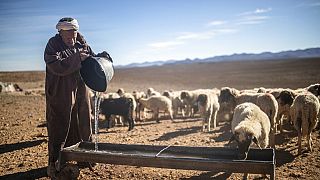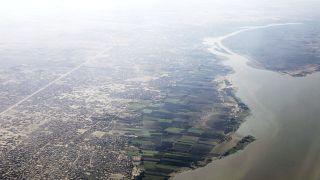Egypt
In Egypt, farmers working the land along the Nile River Delta are facing increasing hardship as rising sea levels cover the once fertile soil with sheets of dried salt.
There are increasing concerns that this threat might spread if urgent measures are not taken to combat the rising seawater.
The United Nations Intergovernmental Panel on Climate Change has described the Nile Delta as one of the world's three most vulnerable hotspots for climate change impacts, including rising sea levels.
Crops suffering
On the ground, people like Salama al-Sayegh who farms in the town of Rosetta, see their crops deteriorate from one year to the next.
‘The land was dry before, we never had soil salinity or water problems. Now the water levels are high as Rosetta is close to the sea. So we started planting mango trees as they are more tolerant to thirst,’ said al-Sayegh.
He is not the only farmer in the region to change his way of farming. Most of farms in the town used to grow tomatoes, watermelons, vegetables, and some field crops like beans.
But due to climate change and increased soil salinity, the earth has become less responsive to their normal crops and many have had to shift to fruit trees as they are more resistant to the changes.
In Abis village, farmers are harvesting rice crops planted using new seed varieties and different plantation methods that are more tolerant to thirst.
‘This crop needs to be irrigated every six to eight days, compared to the regular seeds that require the immersion of rice fields with water, saving between 20 and 30 per cent of the water it needs,’ says Doaa Khamis, head of the guidance department in Alexandria's Agriculture bureau.
Egypt's breadbasket
The Nile Delta covers roughly 240 square kilometres, starting just north of the capital Cairo where the river fans out, creating rich, fertile land by depositing silt along the its branches as they make their way to the Mediterranean Sea.
The region is heavily populated, home to some 40 per cent of Egypt's 104 million people and accounts for half of the country's economy, according to the UN Food and Agriculture Organization (FAO).
‘The impact of sea level rise and sea water intrusion into the body of the delta is really impacting the productivity of the land, turning the land into saline soil that makes it hard for farmers to deal with,’ says Mohamed Abdel Monem, a senior adviser on land and climate change with the FAO.
Farms and fisheries along the two Nile branches, Rosetta in the west and Damietta in the east, help feed the country and provide products for export.
All of that is increasingly threatened by climate change and rising seas.
As Egypt prepares to host the COP27 climate summit, it say the situation in the delta is foremost among its concerns. And residents of the region are hoping for help to deal with the consequences of a warming planet.












Go to video
84% of world's coral reefs affected by worst coral bleaching event in history
01:42
Cairo service honours Pope Francis' legacy
01:40
‘The Herds’ puppets highlight climate change in Lagos
Go to video
South African orphanage rehabilitates injured predator birds
01:37
Indigenous and climate activists rally in Brasília ahead of COP30
Go to video
Letsile Tebogo shines at FNB Golden Prix ahead of 2025 World Championships